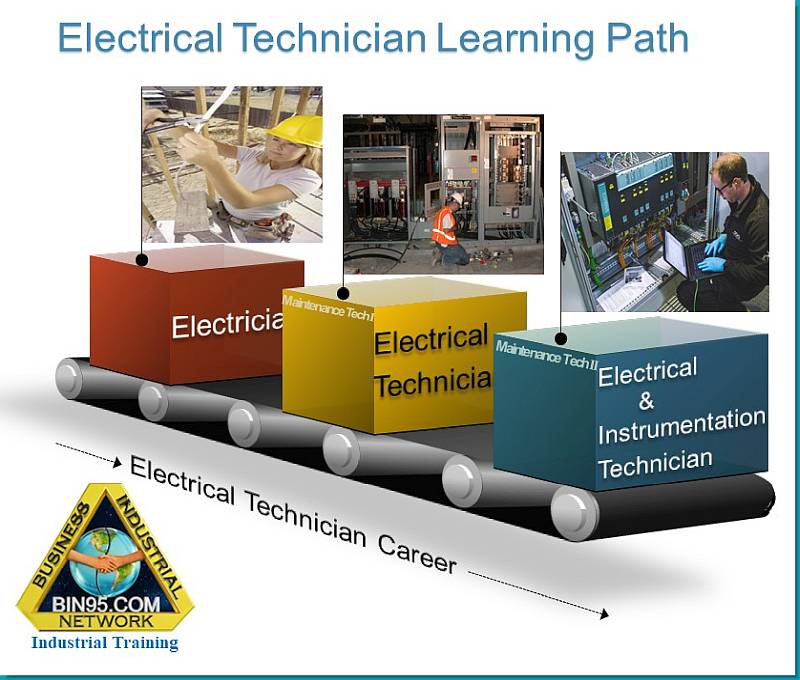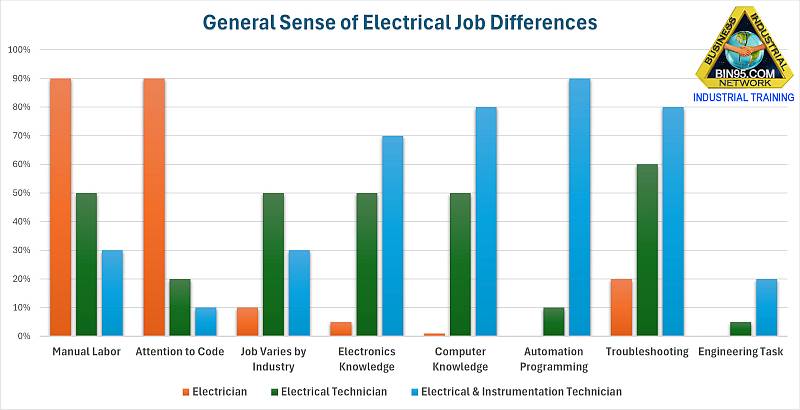
Electrical Technician Pre-Screen Assessment
Electrical Technician Pre-Screen :
This is a basic test for an electrical technician. It has 10 questions, 5 on electrical units of measurement + 5 others. Suitable for a resume pre-screening.
Please consider our training while here ...

Learn more with our Automation specialist Course Bundle. Bundle and Save 32%! Courses never expire, they are there when it"s time to refresh.
Electrical Technician Pre-Screen test details:
( 10 Questions )
Above is the electrical technician basics test. It has ten questions. The first five are on electrical units. Then, there are five more challenging questions. Suitable for an electrical technician resume pre-screening. Also, see the details below for those starting a new career or job. There is insight into learning and career paths.
Career Comparison of the Electrician, Electrical Technician, and the Electrical Instrumentation Technician.
Electrical Technician Learning Path:

Electrician to Electrical Instrumentation Technician Learning/Career Path
The path from electrician to electrical technician involves gaining knowledge and skills. They need to learn more about electrical principles, math, and physics. This will help them move up from electrician to electrical technician. They should also learn about electrical testing equipment and troubleshooting.
Moving from an electrical technician to an E&I technician (Electrical and Instrumentation Technician) requires even more learning. It is in the field of instrumentation. This includes understanding various instrumentation technologies, control systems, and process control equipment. You need to know electronics. You also need to know computer systems and programming. You need these skills to work on instrumentation systems.
Electrical and instrumentation technicians should focus on developing their tech reading skills. They need to read blueprints, schematics, and technical drawings. These drawings relate to both electrical and instrumentation systems. Understanding safety rules and rules about instrumentation work is also critical.
Job Duties and Pay of an Electrician Compared to an Electrical Technician and Electrical Instrumentation Technician:

Electrician to Electrical Instrumentation Technician Job Comparison
Electricians, electrical technicians, and E&I technicians work in many industries. Each has distinct job duties and pay scales. Understanding role distinctions allows individuals to make informed career decisions. It can also help employers find the specific skills needed for their projects.
Electricians specialize in installing, maintaining, and fixing electrical systems. They work in homes, businesses, and factories. Their job duties often include:
- Reading blueprints and wiring buildings.
- Inspecting electrical components.
- Ensuring that electrical systems follow local and national electrical codes.
Electricians also troubleshoot electrical issues. They repair or replace faulty wiring, fixtures, and equipment.
Yet, electrical technicians do more specialized tasks. They conduct tests on electrical systems and equipment. They analyze data to find electrical problems. They also do maintenance to keep electrical machinery running. They collaborate with engineers and technologists in a unified effort. They work to develop and improve electrical systems. They may assist in the design and implementation of new electrical infrastructure.
In comparison, electrical and instrumentation technicians have a broader scope of duties. They cover the process and manufacturing industry's electrical, instrumentation, and control systems. These professionals install, maintain, and repair complex devices. These include sensors, transmitters, and PLCs. They work on process control equipment. They often work with engineers to improve and fix industrial automation systems.
Electricians' pay scales have a median annual wage of about $56,180. This is according to the U.S. Bureau of Labor Statistics. Electrical technicians command a median salary of about $64,330 per year. This reflects their specialized expertise. They have advanced skills. They earn a median annual wage of $65,260. This wage is higher than the salaries of electricians and electrical technicians.
Job listings for E&I technicians are often called maintenance technicians or similar. Even a job listing for an "Electrician" might be for a maintenance technician.
In summary, the path has three steps. First, the electrician. Then, the electrical technician. Finally, the electrical and instrumentation technician. At each step, you learn more about electrical systems and instrumentation. It also requires fixing and maintaining complex electrical and instrumentation systems. Electricians, electrical technicians, and E&I technicians share a common foundation. It is in electrical work. However, their job duties and pay levels are different. They reflect the specific knowledge each role needs. Aspiring professionals can consider these factors when evaluating career paths. Employers can better reach their goals by understanding these professionals' unique contributions.
Published:
